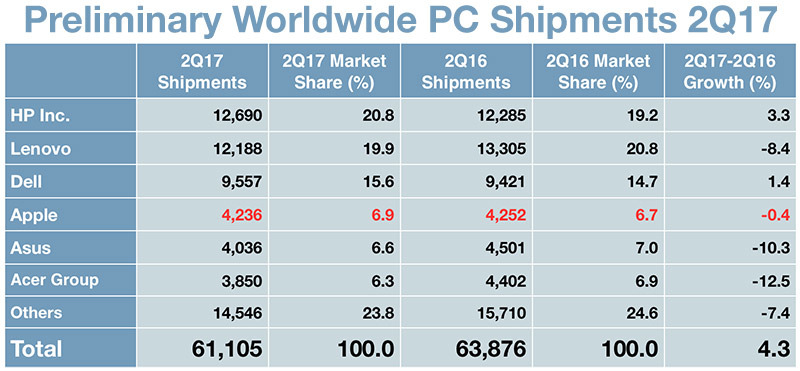Despite the debut of a slew of new Mac products in June, Apple's PC sales dipped in the second quarter of 2017, though greater losses from competitors helped buoy the tech giant's overall market share, according to estimates from market research firm Gartner.
According to Gartner's latest statistics, published on Wednesday, Apple rose one spot to end the quarter in fourth place with 4.24 million units shipped. The performance was down 0.4 percent compared to last year, when the company sold 4.25 million Macs. For the quarter, Apple captured 6.9 percent of the worldwide market, up from 6.7 percent in the second quarter of 2016.
Chinese PC maker Lenovo saw a decline in the period, dropping from 13.3 million units shipped in 2016 to 12.2 million units in the most recent quarter, a sales decline of 8.4 percent. The slip allowed HP to sneak into first place with a 20.8 percent share of the market on 12.7 million shipments, up a modest 3.3 percent year-over-year.
Dell rounded out the top three with 9.6 million units shipped, translating to a 15.6 percent market share, up 1.4 percent on the year. Asus and Acer placed a respective fifth and sixth, though both budget firms suffered massive declines. Asus sold 4 million units for a 6.6 percent share of the market, down 10.3 percent year on year, while Acer shipments slipped 12.5 percent to end the quarter at an estimated 3.9 million units for a 6.3 percent share.
Despite the slowdown in sales from major vendors Lenovo, Apple, Asus and Acer, overall PC shipments were up 4.3 percent on a year-over-year basis.
"Higher PC prices due to the impact of component shortages for DRAM, solid state drives (SSDs) and LCD panels had a pronounced negative impact on PC demand in the second quarter of 2017," said Mikako Kitagawa, principal analyst at Gartner. "The approach to higher component costs varied by vendor. Some decided to absorb the component price hike without raising the final price of their devices, while other vendors transferred the costs to the end-user price."
The results are curious considering Apple debuted a slate of new and refreshed hardware, including MacBook, MacBook Pro and iMac, at a special event in June. More peculiar are Gartner's estimates for the U.S., one of Mac's strongest markets.
Gartner's numbers show a 9.6 percent decline in Mac shipments for Apple's domestic market on shipments of 1.7 million units. Apple managed to maintain its fourth place spot with an 11.8 percent market share. Third-place finisher Lenovo saw shipment declines of 16.3 percent, ending the quarter with 1.9 million units shipped, good enough for 13.2 percent of the market.
HP held on to the No. 1 spot in the U.S., growing its stake to 30.5 percent on 4.3 million unit shipments, while Dell placed second with a 27.7 percent market share and 3.9 million units shipped.
Apple fared better in numbers released by IDC today, which place worldwide Mac shipments at 4.3 million for the quarter, up 1.7 percent year-over-year. Apple captured 7.2 percent of the market to take fourth place, the firm said.
Like Gartner's estimates, IDC has HP leading the pack with 13.8 million units shipped for a 22.8 percent share of the worldwide market, up 6.2 percent. Lenovo dropped 5.7 percent on the year to take second place with 12.4 million shipments and 20.5 percent of the market, while Dell came in third with 10.3 million units shipped and a 17.1 percent market share. Asus rounded out the top five with 4.1 million units shipped, down 8.6 percent from the same period last year.
 Mikey Campbell
Mikey Campbell







-m.jpg)






 Charles Martin
Charles Martin

 Malcolm Owen
Malcolm Owen
 William Gallagher
William Gallagher

 Christine McKee
Christine McKee
 Wesley Hilliard
Wesley Hilliard








48 Comments
Apple knows better but in my opinion, Apple needs to make low end one model each(13" and 15") Macbook Pro with 8GB, 256GB at decent price point. These macbooks than become goto Macbook pro for very large group of users who care less about performance, bells-whistle but reasonable price and loves MBP/MacOS. Later in their life, the same group of people when upgrade their MBP, they would buy higher end models.
The final tally makes no sense whatsoever. 63876 for 2016 and 61105 for 2017. How could that translate to 4.3% growth?
Apple should reduce Mac price and release both a mini tower plus display and Mac tablet. Once Mac gets 25% worldwide market share, Windows will be history in three years.